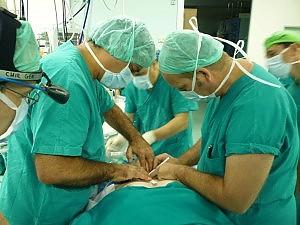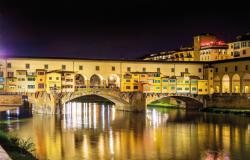Two patients suffering from trachea cancer, a 31-year-old Czech woman and a 19-year-old British woman, received successful trachea [windpipe] transplants using their own stem cells in Italy during July. This is the first time such a procedure has been carried out in Italy but the technique was pioneered by a Swiss-born Italian doctor two years ago in Spain.
Dr Paolo Macchiarini headed the team of forty doctors and nurses during the ten-hour operations using donor windpipes which had been stripped of their cells and then injected with regenerated tissue from the noses and bone marrow of the two patients. The stem cells will take two to three months to grow but the tracheae are functional. The patients will not need anti-rejection drugs because the tracheae contain their own tissue.
In another first for Italy, the patients received radiation therapy during the operations in order to reduce the risk of recidivous tumours.
The British patient was able to speak three or four days after the operation, said a spokesman at the Careggi University Hospital in Florence. Both patients have now been discharged and the Czech patient is the mother of a five-month-old baby.
Dr Macchiarini told a press conference that the technique could, in the future, be used on other organs.
You would imagine, then, that all at the Careggi are happy and of course they are, with regard to the result of the surgery.
However, with regard to Dr Macchiarini, an enormous row, now dubbed “il giallo di Macchiarini” [“The Macchiarini Mystery”] by the media, has developed:
Dr Macchiarini [51] joined the Careggi as Head of the Department of General Thoracic and Regenerative Surgery and Intrathoracic Biotransplantation earlier this year from the University of Barcelona, where he was Head of Thoracic Surgery.
According to his statement, he was offered both a clinical and a teaching post but the University post, which he had hoped would allow him to train talented young doctors in his techniques, has not materialised. He was also promised research funding from several sources but only the Region of Tuscany has so far kept its promise.
Dr Macchiairini is frustrated with Italian bureaucratic procedures in the academic world and says he does not understand why, after four meetings of the Academic Board at the Careggi, he has still not officially been offered the University post. The somewhat embarrassed President of the Careggi has said that certain procedures have to be followed in all Italian universities and the main stumbling block seems to be that Dr Macchiarini has not been a candidate in Italy’s complicated series of written competitions for academic posts. Dr Macchiarini sweeps this reasoning aside, saying that the University of London and the Karolinska Institute in Stockholm only had to read his CV to offer him a post.
Now Dr Macchiarini has accepted an academic post at the Karolinska Institute, although he will not yet abandon his medical work at the Careggi. A new contract, which will allow him to work in both locations, is being drawn up by the Careggi.
The President of the Tuscan Region, Enrico Rossi, who was instrumental in persuading Dr Macchiarini to return to Italy, has expressed his disappointment at the fact that it will not be possible for Dr Macchiarini to establish a specialist medical school in Italy and his sincere hope that the “super surgeon” will not leave the Careggi entirely.
Do you sympathise with Dr Macchiarini or the University Board?





